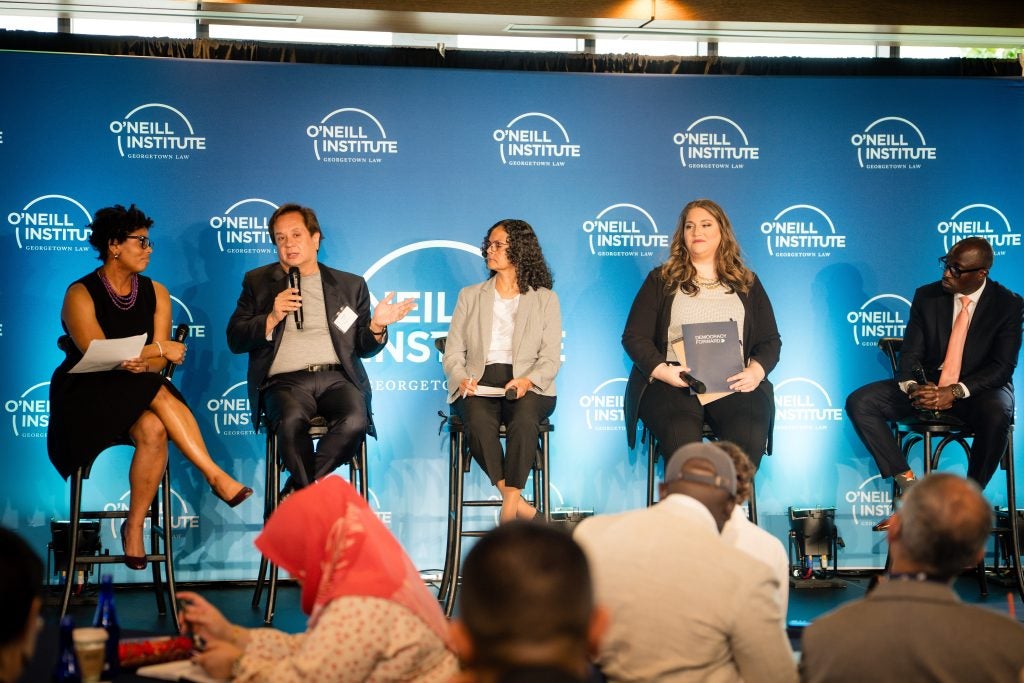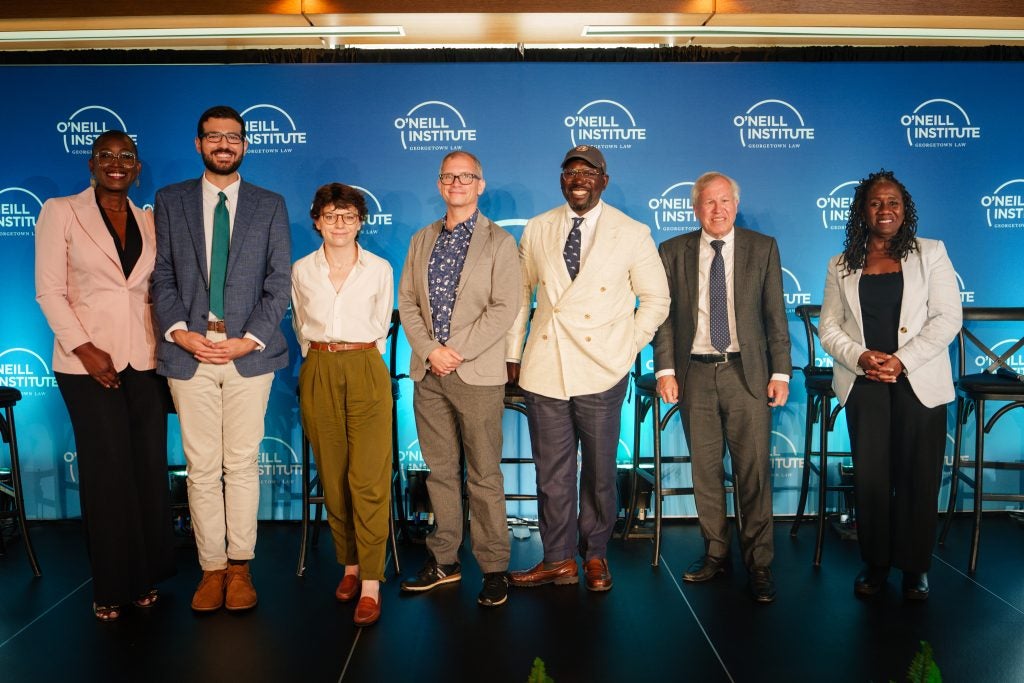Georgetown Law and O’Neill Institute Host Second Annual “Supreme Court Term in Review”
July 9, 2025

Hundreds of attendees convened at Georgetown Law for the second annual “Supreme Court Term in Review” co-hosted by the O’Neill Institute for National and Global Health Law. Photo credit: Derek Lamar Studios.
Top legal advocates, scholars and journalists convened at Georgetown Law July 2 to analyze some of the most consequential and controversial decisions of the Supreme Court’s 2024-25 term, from immigrant deportations to nationwide injunctions to transgender rights.
Co-hosted by the O’Neill Institute for National and Global Health Law and sponsored by the American Constitution Society, the Brennan Center for Justice, the Feminist Majority Foundation, Ms. Magazine and Ms. Studios, the second annual “Supreme Court Term in Review” also attracted more than 200 attendees from Georgetown Law and the broader community.
“At a time when protecting and preserving the rule of law is top of mind for many, the chance to gather hundreds of advocates, scholars, reporters and students for such a convening is an important — and urgent — undertaking,” said O’Neill Institute Co-Faculty Director Professor Michele Bratcher Goodwin following the event.
Losing an ‘important judicial check’
Goodwin moderated the “Supreme Court Term in Review” panel, which included Dean Erwin Chemerinsky of UC Berkeley School of Law, Professor Sherrilyn Ifill of Howard University School of Law, Mark Joseph Stern, C’13, L’16, of Slate, Moira Donegan of The Guardian, Jamelle Bouie of The New York Times and Chris Geidner of Law Dork.
The panelists discussed the significance of the Court’s recent rulings in cases such as Kennedy v. Braidwood, United States v. Skrmetti, Medina v. Planned Parenthood, and Trump v. CASA, including the decisions’ implications for presidential power and civil liberties.
“[We lost] an important judicial check on the federal government,” said Chemerinsky regarding the Court’s 6-3 decision in Trump v. CASA, which limits judges’ ability to block executive branch policies through so-called “universal” or nationwide injunctions.
“This lessens the power of federal courts to check the executive branch of government, and it happens at the moment when the executive branch is systematically ignoring the Constitution,” he said of the ruling, which has implications for the enforcement of a January 2025 executive order targeting birthright citizenship. “I think what the Supreme Court has done is very much abdicate its role.”
The review panel was preceded by “Litigating in the Trump Era: Protecting and Preserving the Rule of Law,” for which Regina Mahone of The Nation was joined by Lincoln Project Co-Founder George Conway, Pregnancy Justice President Lourdes A. Rivera, Democracy Forward President and CEO Skye Perryman, L’07 and O’Neill Institute Center for Health Policy and the Law Director Andrew Twinamatsiko.
Speakers discussed the strategies by which civic and advocacy organizations can protect and advance the rule of law and call for government accountability in light of recent rulings that bolster executive power.
“They will overreach. They are going to blow themselves up at some point. The question … is what’s the blast radius going to be?,” said Conway of the presidential administration. “That’s the reason why we need to keep fighting.”

L-R: Regina Mahone, George Conway, Lourdes A. Rivera, Skye Perryman, L’07 and Andrew Twinamatsiko. Photo credit: Derek Lamar Studios.
‘The concrete work of judging’
Panelists also discussed the Court’s jurisprudence and expressed concern about an approach characterized by legal abstraction rather than a concern for the real-world impacts of judicial decision-making.
“The Court is pretending as if it operates in this world of total abstraction, that they can do pure law and they don’t have to worry about context,” said Bouie, citing both the Court’s recent decisions and oral arguments in last term’s presidential immunity case Trump v. United States. “[But] the concrete work of judging … is fundamentally a material thing.”
When asked about their predictions for the future of the Supreme Court, speakers addressed the possibility of judicial reform and the ongoing work of district court judges in defending against executive branch overreach.
“We need to reimagine our Supreme Court and … how [we] evaluate whether a distinguished lawyer has what it takes to take on the awesome responsibility of sitting on the United States Supreme Court,” Ifill said.

L-R: Professor Michele Bratcher Goodwin, Mark Joseph Stern, C’13, L’16, Moira Donegan, Chris Geidner, Jamelle Bouie, Dean Erwin Chemerinsky and Professor Sherrilyn Ifill. Photo credit: Derek Lamar Studios.
Click here to view a full recording of the first panel, “Litigating in the Trump Era: Protecting and Preserving the Rule of Law,” as recorded by C-SPAN. Click here to view a full recording of the second panel, “Supreme Court Term in Review,” as recorded by C-SPAN.